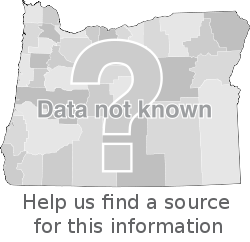- Oregon Ballot Measures 66 and 67 (2010)
-
Measure 66 Raises tax on household income at and above $250,000 (and $125,000 for individual filers). Reduces income taxes on unemployment benefits in 2009. Provides funds currently budgeted for education, health care, public safety, other services. Election results Yes or no Votes Percentage  Yes
Yes692,687 54.27% No 583,707 45.73% Invalid or blank votes % Total votes 1,276,394 100.00% Voter turnout 62.7% Election results by YesNoSource: Oregon Secretary of State[1][2] Measures 66 and 67 are two ballot referenda that were on the January 26, 2010 special election ballot in the U.S. state of Oregon, which proposed tax increases on corporations and on households making $250,000 and individuals making $125,000 to help balance the state's budget. The measures referred two bills passed by the Oregon state legislature on June 11, 2009, and signed by Governor Ted Kulongoski on July 20, 2009, to the voters for approval. They were approved and became effective February 25, 2010.[3]
Contents
Background
The recession that greatly impacted the American economy starting in late 2008 caused a budget shortfall in Oregon that the state legislature had to make up for. A critical factor in this process was that the 2008 general election gave Democrats a three-fifths majority in both chambers of the legislature, which is the supermajority needed to pass any bills calling for revenue increases. Among other actions, the legislature passed House Bills 2649 and 3405, raising taxes on corporations and on wealthy individuals and households, respectively. Some Oregon citizens[4][note 1] started a drive to force a referendum on these bills, believing they would hurt the state's economy.
While 55,179 valid signatures from registered voters on each referendum petition were needed to qualify the referendum for the ballot,[5][note 2] about 99,000 valid signatures were filed. Don Hamilton, spokesman for the Oregon Secretary of State's office, remarked that "it's unusually high for a statewide ballot measure."[6] On October 8, 2009, the Secretary of State's office announced that both measures qualified for the January 26, 2010 ballot.
Campaign
Businesses largely opposed the two measures, with groups such as the Associated Oregon Industries campaigning against both.[7] The top individual donor was Phil Knight of Nike, who gave $150,000.
The yes vote was supported by educators and public employee unions.[7] Politically, the Oregon Democratic Party supported the measures while the Oregon Republican Party opposed the measures.[citation needed] The campaigns for and against these measures spent the second most amount of money ever waged on a ballot measure campaign in the state.[8] Only Ballot Measure 50 in 2007 was more expensive than the $12.5 million spent on the yes and no campaigns of Measures 66 and 67.[8]Results
Measure 67 Raises $10 corporate minimum tax, business minimum tax, corporate profits tax. Provides funds currently budgeted for education, health care, public safety, other services. Election results Yes or no Votes Percentage  Yes
Yes682,720 53.59% No 591,188 46.41% Invalid or blank votes % Total votes 1,273,908 100.00% Voter turnout 62.7% Election results by YesNoSource: Oregon Secretary of State[1][2] Measure 66 Choice Votes Percentage  Yes
Yes692,687 54.27% No 583,707 45.73% Total votes 1,276,394 100.00% Voter turnout 62.7% Electorate 2,044,042 Source: Oregon State Elections Division[1][2] Measure 67 Choice Votes Percentage  Yes
Yes682,720 53.59% No 591,188 46.41% Total votes 1,273,908 100.00% Voter turnout 62.7% Electorate 2,044,042 Source: Oregon State Elections Division[1][2] Notes
- ^ Current funding sources of the campaign against the ballot measures can be found at this link.
- ^ More precisely, supporters of a referendum must file a number of valid signatures from registered voters equal to four percent of votes cast in the last gubernatorial election — in this case, the 2006 gubernatorial election.
See also
References
- ^ a b c d Brown, Kate (February 25, 2010). "January 26, 2010, Special Election Abstracts of Votes" (PDF). Elections Division. Oregon Secretary of State. http://www.sos.state.or.us/elections/jan262010/s10_abstract.pdf. Retrieved April 3, 2010.
- ^ a b c d [1]
- ^ David Steves (January 27, 2010). "Oregon voters firmly approve raising taxes". The Register-Guard. registerguard.com. http://www.registerguard.com/csp/cms/sites/web/news/cityregion/24396690-41/tax-measures-oregon-state-percent.csp. Retrieved January 27, 2010.
- ^ http://www.commoncause.org/site/pp.asp?c=dkLNK1MQIwG&b=5694189
- ^ http://bluebook.state.or.us/state/elections/elections09.htm
- ^ http://djcoregon.com/news/2009/10/08/tax-related-measures-qualify-for-special-election/
- ^ a b Walth, Brent (March 3, 2010). "The closing tally on the Measures 66 and 67 campaigns: $12.5 million". The Oregonian. http://www.oregonlive.com/politics/index.ssf/2010/03/the_closing_tally_on_measures.html. Retrieved 4 April 2010.
- ^ a b Mapes, Jeff (April 3, 2010). "Only a few ballot initiatives look to qualify for Oregon ballot this November". The Oregonian. http://www.oregonlive.com/politics/index.ssf/2010/04/only_a_few_ballot_initiatives.html. Retrieved 4 April 2010.
External links
- Oregon Measures 66 and 67 on Ballotpedia.
Categories:- Oregon 2010 ballot measures
- Taxation in Oregon
Wikimedia Foundation. 2010.


